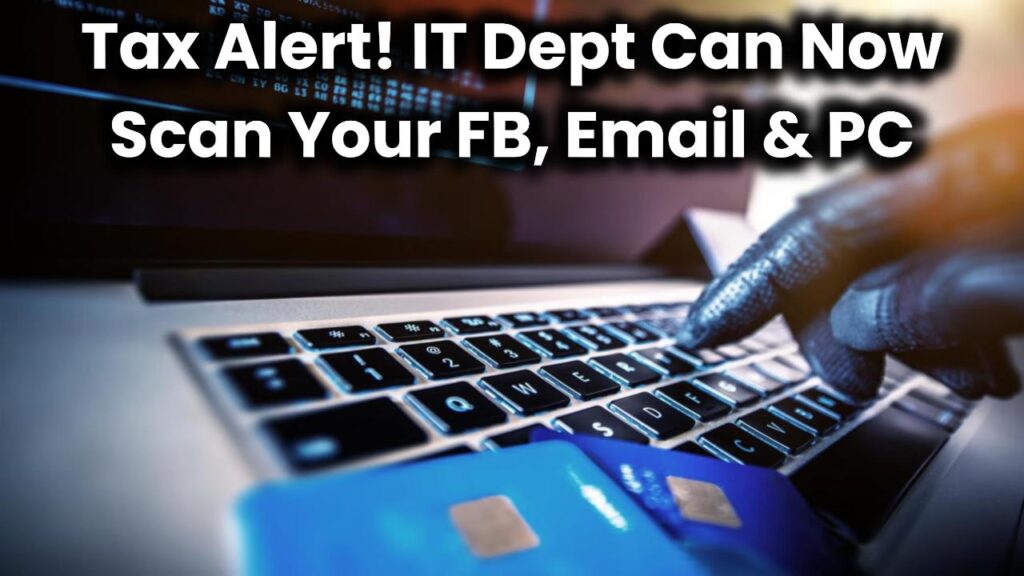
The Income Tax Department is tightening its grip on tax evaders by introducing new measures that allow tax authorities to scrutinize digital records, including Facebook, emails, and even computer data. This change is part of the proposed Income Tax Bill, 2025, which aims to modernize the tax system and combat financial fraud. But what does this mean for honest taxpayers, and how can you protect your digital privacy while staying compliant?
Taxpayers Beware
| Feature | Details |
|---|---|
| New IT Bill | Empowers tax authorities to access electronic records, including emails and social media |
| Scope of Access | Tax officers can override digital systems if access is denied |
| Legal Concerns | Privacy risks and potential misuse of power |
| Taxpayer Rights | Legal recourse available if rights are violated |
| Source | Government Official Website |
The proposed Income Tax Bill, 2025 introduces sweeping changes that could impact both individuals and businesses. While the law aims to tackle tax fraud, it also raises serious privacy concerns. The best way to stay protected is by ensuring accurate tax compliance, securing digital data, and understanding legal rights.
Understanding the New IT Bill & Its Implications
1. What Is the New Income Tax Bill, 2025?
The Income Tax Bill, 2025 proposes an overhaul of the existing six-decade-old tax laws. One of its most debated provisions is the power granted to tax authorities to inspect taxpayers’ digital records, which include:
- Emails (Gmail, Outlook, etc.)
- Social Media Accounts (Facebook, Instagram, Twitter, LinkedIn)
- Online Banking and Trading Accounts
- Cloud Storage & Personal Computer Data
The goal is to track unreported income, digital transactions, and offshore tax evasion more effectively.
2. How Can Authorities Access Your Digital Data?
Tax officers conducting searches can demand access to any “virtual digital space” that might contain financial records or evidence of tax evasion. If a taxpayer refuses access, the law empowers officials to override security settings and retrieve the required data.
Example: If a business owner claims minimal income but has luxury expenses visible on their Facebook and Instagram, authorities might check their online transactions to verify if taxes are being legally filed.
3. What Are the Legal & Privacy Concerns?
Legal experts warn that such powers may lead to misuse if not regulated properly. Concerns include:
- Risk of privacy invasion – accessing personal emails and social media could violate fundamental privacy rights.
- Harassment of innocent taxpayers – legitimate taxpayers may face unnecessary scrutiny.
- Data security issues – government access to sensitive business and personal information raises cybersecurity risks.
What You Can Do:
- Keep digital records clean and organized.
- File taxes accurately and on time to avoid suspicion.
- Use two-factor authentication (2FA) to secure digital assets.
- Know your legal rights and seek professional guidance if needed.
Steps to Stay Compliant & Protect Your Digital Privacy
1. Maintain Proper Tax Records
Ensure that all income sources, expenses, and deductions are properly documented. Use:
- Cloud accounting software (QuickBooks, Tally, Zoho Books)
- E-filing tools to report taxes correctly
- Separate personal and business accounts to avoid confusion
2. Secure Your Digital Footprint
Since tax officials may scrutinize online activity, it is wise to keep personal and professional data separate and secure:
- Limit sharing financial details on social media.
- Regularly update passwords for banking and email accounts.
- Enable encryption for important files and digital documents.
3. Know Your Rights as a Taxpayer
While authorities have been given broad powers, taxpayers also have legal rights, including:
- Right to Legal Counsel – You can consult a tax lawyer if your privacy is at risk.
- Right to Appeal – If you feel wrongfully targeted, you can challenge the search.
- Right to Know Why – Officials must explain why your data is being accessed.
4. Use Professional Tax Advisors
Engage a chartered accountant (CA) or tax consultant to:
- Keep tax filings compliant with new laws
- Help structure income legally to reduce scrutiny
- Defend your case in case of a legal tax investigation
Additional Measures for Business Owners & Entrepreneurs
1. Implement Robust Cybersecurity Protocols
Businesses should take extra precautions to protect sensitive financial data:
- Use VPNs when accessing confidential tax or financial data.
- Encrypt sensitive financial documents before storing them online.
- Audit employee access to financial records to prevent unauthorized sharing.
2. Keep Business & Personal Transactions Separate
Entrepreneurs must ensure that business transactions are not mixed with personal expenses, which can raise red flags during audits.
- Maintain distinct bank accounts for business and personal use.
- Use business credit cards for all work-related expenses.
3. Leverage Tax Exemptions & Deductions
Taxpayers should take full advantage of legally available deductions:
- Home office deductions for self-employed professionals.
- GST credits for businesses on eligible purchases.
- Investment in tax-saving instruments (PPF, ELSS, NPS, etc.)
FAQs On Taxpayers Beware
1. Can the tax department really check my social media?
Yes, under the proposed Income Tax Bill, 2025, tax officials can inspect social media and online activities to verify financial credibility.
2. What happens if I refuse access to my emails or computer?
Tax officials can override your system and access the required information if they suspect tax evasion or financial fraud.
3. How can I secure my digital privacy?
Use encrypted communication tools, two-factor authentication (2FA), and separate accounts for business and personal use.
4. Is this law already in effect?
No, it is still under review by the government, but it is expected to be passed soon.
5. Can authorities check my bank account without permission?
Yes, if you are under investigation, officials can access banking records, credit card statements, and online transactions.







